8 March 2019. Women in Colombia are peacebuilders, human rights defenders, land and environmental activists. Every defender has her own story. Women defenders come from all walks of life: they are Afro-Colombian or Indigenous women; LGBTI activists; lawyers; journalists and campesinas. Many women became human rights defenders as a result of their experience of being victims of the armed conflict and survivors of conflict-related sexual violence, supporting other victims and defending the rights of others. International Women’s Day is an occasion to pay tribute to the tireless work by these courageous Colombian Women Human Rights Defenders (WHRDs) who – in spite of threats and violence against them – continue to advocate equal rights and a victims-centred peace based on truth, justice, reparation and non-repetition in Colombia.
The historic gender focus in the Final Peace Accord is a unique opportunity to further promote Colombian women’s political participation, advance gender equality and promote structural change. However, only a small percentage of the agreements benefiting women have been fully implemented so far.
The work of WHRDs on the gender focus in the Peace Accord and more recently its implementation has raised their profile. Threats, attacks and killings differ from their male counterparts in that women are not only attacked for defending the rights of others, but also because, by earning a visible place in the public sphere they have crossed a ‘limit imposed’ on women and are being ‘punished’ for that. The number of women killed annually doubled during the Peace Talks between 2012 and 2016, and then doubled again in just one year, from 2016 to 2017.
— ABColombia Report “Towards Transformative Change” (2018)
This year, ABColombia nominated five inspiring Human Rights Defenders from ABColombia partner organisations for the #InspiredByHer social media campaign on International Women’s Day. Five women who, among so many other inspiring women defenders in Colombia, are examples of the perseverance, courage and extraordinary struggle of Colombian civil society towards a negotiated peace, with social justice and inclusive development.
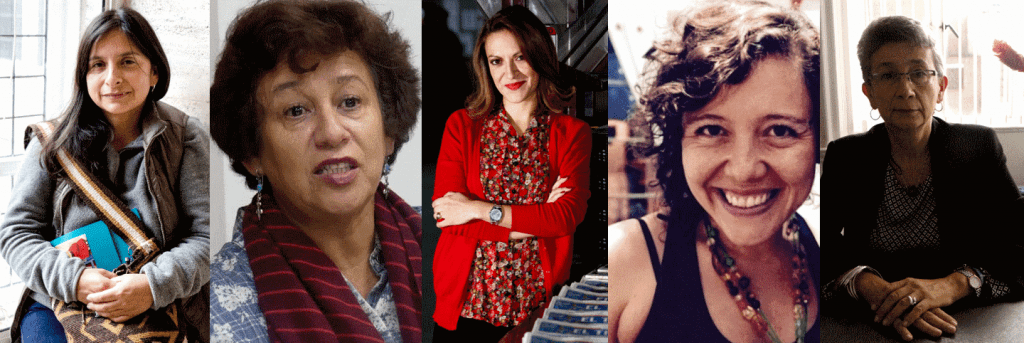
Janneth Lozano Bustos
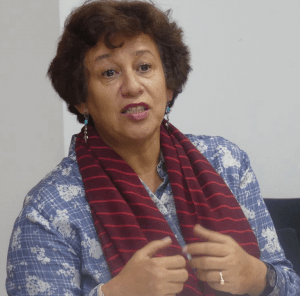
Janneth Lozano is the Director of the Grassroots Community Support Corporation Codacop. She works with Indigenous communities in Colombia to economically empower women so that they can enjoy autonomy over their lives and resources. Janneth Lozano started working with Indigenous women at a time when there was hardly any concept of Indigenous women holding and claiming individual rights. Her work links peacebuilding in Colombia with Sustainable Development Goal 8, which promotes sustained, inclusive and sustainable economic growth for all, and SDG 5, on gender equality and empowerment of all women, including women’s equal rights over resources.
ABColombia partner Codacop is an interdisciplinary Colombian civil society organisation, working in support of community-based groups seeking alternative models of development. Codacop works with Indigenous communities to promote autonomy and self-management and adopts a holistic approach by providing advice, training programmes, promoting networks and linking different civil society groups.
Jineth Bedoya Lima
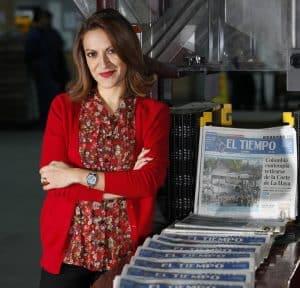
Jineth Bedoya is a women’s rights activist and journalist at the Colombian newspaper El Tiempo. She has received a number of national and international awards for her journalistic work. The sexual attack against her is one example of the way in which sexual violence is employed as a means of intimidating and silencing women investigative journalists, and to punish women defenders for their work defending the rights of others.
Due to the failure of the Colombian state to ensure justice in her case, Jineth Bedoya took her case to the Inter-American Commission.
Since her attack in 2000, Jineth Bedoya has campaigned against the high levels of impunity for sexual violence and other forms of gender-based violence in Colombia. She leads the campaign #NoEsHoraDeCallar to raise public awareness of violence against women and girls and supports women’s initiatives against violence across Colombia. In 2018, together with ABColombia, Jineth Bedoya supported Patricia Espitia, founder of the NGO Ven Seremos, to come to London to raise awareness for acid violence in Colombia.
Claudia María Mejia Duque
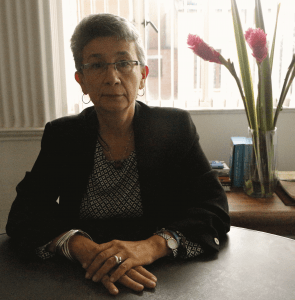
Claudia María Mejia Duque is a Colombian Human Rights lawyer and the Director of ABColombia partner Sisma Mujer. She has been promoting and defending women’s rights in Colombia for more than 45 years.
Sisma Mujer is a feminist organisation which works with women and girls victims of gender-based violence and discrimination in the private and public spheres, as well as in the context of the armed conflict. For more than 20 years, Sisma Mujer has worked to increase women’s participation, protect their human rights and promote their role as agents of transformative change in Colombia. Sisma Mujer is part of the National Women’s Network (Red Nacional de Mujeres), an initiative that brings together 150 groups from 15 regions in Colombia to guarantee women’s participation in peacebuilding and human rights.
Lida Emilse Paz Labio
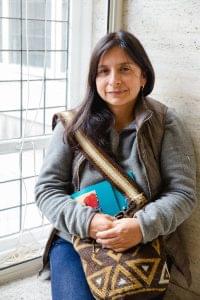
Lida Emilse Paz Labio is an Indigenous woman from the Nasa ethnic group in the territory of North Cauca (southwest Colombia). A victim of the armed conflict, Emilse Paz has become an activist for peace and an authoritative defender of the rights of women and Indigenous peoples. She initiated an advocacy process with Indigenous women on their rights to land and territory and promotes the demilitarization of indigenous territories in northern Cauca.
As Regional Coordinator of Tejido Mujer ACIN (ACIN Women’s Network), she has been involved in research on the impact of the armed conflict on the lives of Indigenous women and participated in forums, hearings, victims’ meetings and other platforms, and contributed to the Peace Talks between the Colombian Government and the FARC in Havana.
Tejido Mujer ACIN forms part of the Association of Indigenous Councils of Northern Cauca (ACIN), which promotes spaces of reflection, education and training for women and men in Indigenous territories. The Tejido Mujer is a meeting space for women from the networks, programmes, Life Plans and other processes of Çxhab Wala Kiwe.
Diana Gunneivia Garcia Salamanca
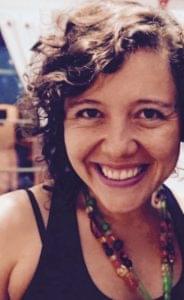
Diana Garcia is a feminist peacebuilder with the Corporation for Research, Social and Economic Action (CIASE). She has been campaigning for peace and the rights of women and girls since she was eight years old. Today, she works with Indigenous communities in remote rural areas in Colombia to develop new perspectives for ecological challenges.
CIASE is a Colombian feminist organisation that works to defend human rights, particularly economic, social, cultural and environmental rights in Colombia. CIASE works closely with marginalised communities and especially Indigenous women, whose territories have been disproportionately affected by Colombia’s armed conflict.
The #InspiredByHer Campaign
#InspiredByHer is a social media campaign by the EU Commission Department for International Cooperation and Development. This year, they asked international civil society organisations to nominate Women Human Rights Defenders whose work can inspire women worldwide. Organisations from all over the world have linked in with this campaign and shared inspiring stories of women on 8 March 2019.
Recommendations on International Women’s Day
On this day, ABColombia would like to encourage the Colombian Government to implement the recommendations made by UN Special Rapporteur Michel Forst in his End of Mission Statement at the end of his official visit to Colombia in November/December 2018. In particular, we would strongly recommend taking up the UN Special Rapporteur’s recommendation regarding the competence of article 8 and 9 of the Optional Protocol to the Convention on the Elimination of All Forms of Discrimination against Women (OP CEDAW). This would allow the CEDAW Committee to initiate a confidential investigation on alleged grave violations of women’s rights.
The ratification of these instruments and the recognition of the communication procedure under articles 8 and 9 of OP CEDAW, would provide human rights defenders with important tools to pursue accountability and to ensure freedom of torture, and realize the rights of women, persons with disabilities, and economic, social and cultural rights.
— Michel Forst, UN Special Rapporteur on the Situation of Human Rights Defenders [1]
In light of the alarmingly high numbers of killings of human rights defenders in Colombia, and the increase in violence and attacks against women defenders in particular, this is an important recommendation to address structural gender-based violence.
Notes
[1] United Nations Special Rapporteur on the Situation of Human Rights Defenders Michel Forst, Visit to Colombia 20 November – 3 December 2018, End of Mission Statement.
